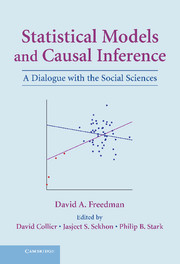Book contents
- Frontmatter
- Contents
- Preface
- Editors' Introduction: Inference and Shoe Leather
- Part I Statistical Modeling: Foundations and Limitations
- 1 Issues in the Foundations of Statistics: Probability and Statistical Models
- 2 Statistical Assumptions as Empirical Commitments
- 3 Statistical Models and Shoe Leather
- Part II Studies in Political Science, Public Policy, and Epidemiology
- Part III New Developments: Progress or Regress?
- Part IV Shoe Leather Revisited
- References and Further Reading
- Index
1 - Issues in the Foundations of Statistics: Probability and Statistical Models
Published online by Cambridge University Press: 05 June 2012
- Frontmatter
- Contents
- Preface
- Editors' Introduction: Inference and Shoe Leather
- Part I Statistical Modeling: Foundations and Limitations
- 1 Issues in the Foundations of Statistics: Probability and Statistical Models
- 2 Statistical Assumptions as Empirical Commitments
- 3 Statistical Models and Shoe Leather
- Part II Studies in Political Science, Public Policy, and Epidemiology
- Part III New Developments: Progress or Regress?
- Part IV Shoe Leather Revisited
- References and Further Reading
- Index
Summary
“Son, no matter how far you travel, or how smart you get, always remember this: Someday, somewhere, a guy is going to show you a nice brand-new deck of cards on which the seal is never broken, and this guy is going to offer to bet you that the jack of spades will jump out of this deck and squirt cider in your ear. But, son, do not bet him, for as sure as you do you are going to get an ear full of cider.”
—Damon RunyonAbstract. After sketching the conflict between objectivists and subjectivists on the foundations of statistics, this chapter discusses an issue facing statisticians of both schools, namely, model validation. Statistical models originate in the study of games of chance and have been successfully applied in the physical and life sciences. However, there are basic problems in applying the models to social phenomena; some of the difficulties will be pointed out. Hooke's law will be contrasted with regression models for salary discrimination, the latter being a fairly typical application in the social sciences.
What is probability?
For a contemporary mathematician, probability is easy to define, as a countably additive set function on a σ-field, with a total mass of one. This definition, perhaps cryptic for non-mathematicians, was introduced by A. N. Kolmogorov around 1930, and has been extremely convenient for mathematical work; theorems can be stated with clarity, and proved with rigor.
Information
- Type
- Chapter
- Information
- Statistical Models and Causal InferenceA Dialogue with the Social Sciences, pp. 3 - 22Publisher: Cambridge University PressPrint publication year: 2009
Accessibility standard: Unknown
Why this information is here
This section outlines the accessibility features of this content - including support for screen readers, full keyboard navigation and high-contrast display options. This may not be relevant for you.Accessibility Information
- 1
- Cited by
